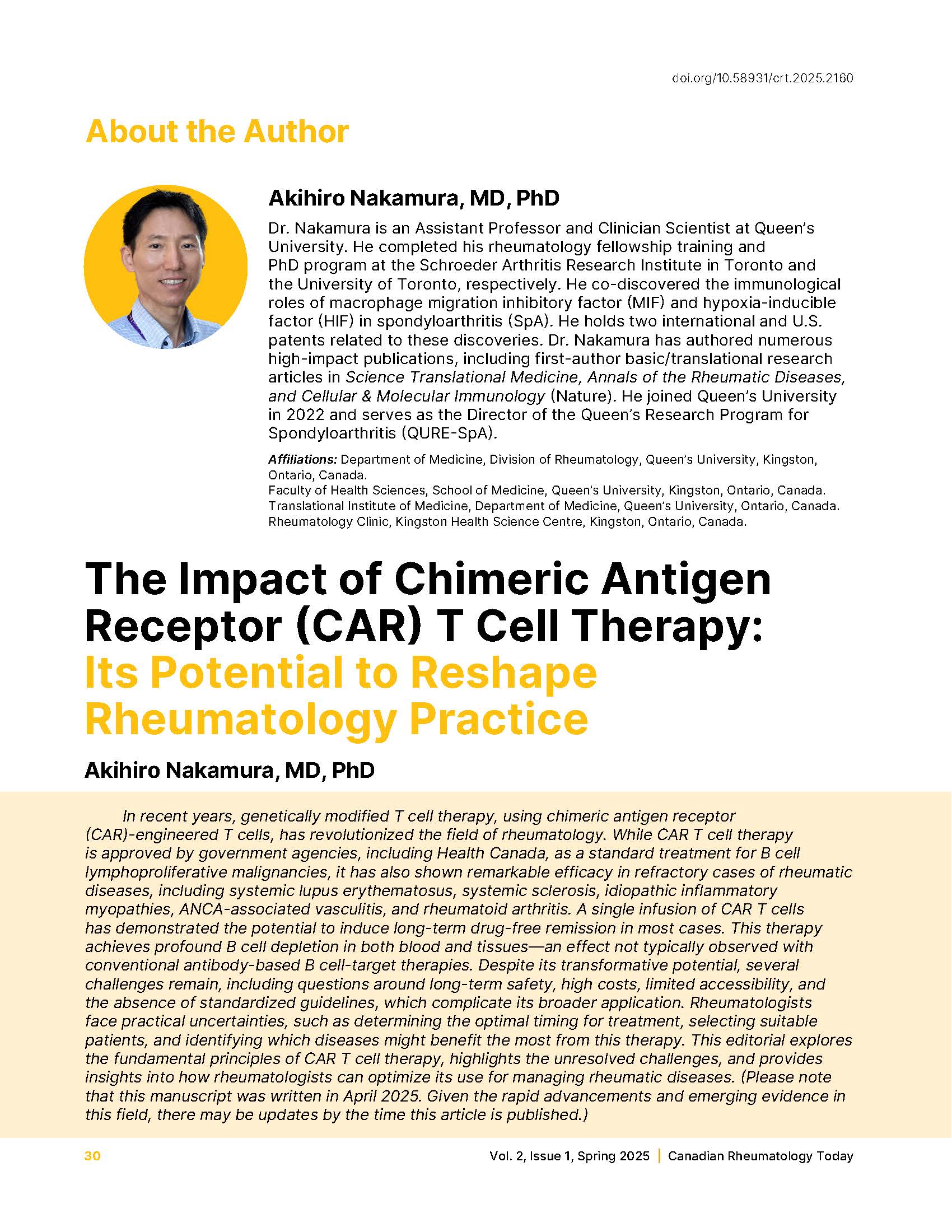The Impact of Chimeric Antigen Receptor (CAR) T Cell Therapy: Its Potential to Reshape Rheumatology Practice
DOI:
https://doi.org/10.58931/crt.2025.2160Abstract
In recent years, genetically modified T cell therapy, using chimeric antigen receptor (CAR)‑engineered T cells, has revolutionized the field of rheumatology. While CAR T cell therapy is approved by government agencies, including Health Canada, as a standard treatment for B cell lymphoproliferative malignancies, it has also shown remarkable efficacy in refractory cases of rheumatic diseases, including systemic lupus erythematosus, systemic sclerosis, idiopathic inflammatory myopathies, ANCA-associated vasculitis, and rheumatoid arthritis. A single infusion of CAR T cells has demonstrated the potential to induce long-term drug-free remission in most cases. This therapy achieves profound B cell depletion in both blood and tissues—an effect not typically observed with conventional antibody-based B cell-target therapies. Despite its transformative potential, several challenges remain, including questions around long-term safety, high costs, limited accessibility, and the absence of standardized guidelines, which complicate its broader application. Rheumatologists face practical uncertainties, such as determining the optimal timing for treatment, selecting suitable patients, and identifying which diseases might benefit the most from this therapy. This editorial explores the fundamental principles of CAR T cell therapy, highlights the unresolved challenges, and provides insights into how rheumatologists can optimize its use for managing rheumatic diseases. (Please note that this manuscript was written in April 2025. Given the rapid advancements and emerging evidence in this field, there may be updates by the time this article is published.)
References
Mackensen A, Müller F, Mougiakakos D, Böltz S, Wilhelm A, Aigner M, et al. Anti-CD19 CAR T cell therapy for refractory systemic lupus erythematosus. Nat Med. 2022;28(10):2124-2132. doi:10.1038/s41591-022-02017-5 DOI: https://doi.org/10.1038/s41591-022-02017-5
Mougiakakos D, Krönke G, Völkl S, Kretschmann S, Aigner M, Kharboutli S, et al. CD19-Targeted CAR T cells in refractory systemic lupus erythematosus. N Engl J Med. 2021;385(6):567-569. doi:10.1056/NEJMc2107725 DOI: https://doi.org/10.1056/NEJMc2107725
Bergmann C, Müller F, Distler JHW, Györfi AH, Völkl S, Aigner M, et al. Treatment of a patient with severe systemic sclerosis (SSc) using CD19-targeted CAR T cells. Ann Rheum Dis. 2023;82(8):1117-1120. doi:10.1136/ard-2023-223952 DOI: https://doi.org/10.1136/ard-2023-223952
Merkt W, Freitag M, Claus M, Kolb P, Falcone V, Röhrich M, et al. Third-generation CD19.CAR-T cell-containing combination therapy in Scl70+ systemic sclerosis. Ann Rheum Dis. 2024;83(4):543-546. doi:10.1136/ard-2023-225174 DOI: https://doi.org/10.1136/ard-2023-225174
Wang X, Wu X, Tan B, Zhu L, Zhang Y, Lin L, et al. Allogeneic CD19-targeted CAR-T therapy in patients with severe myositis and systemic sclerosis. Cell. 2024;187(18):4890-4904.e4899. doi:10.1016/j.cell.2024.06.027 DOI: https://doi.org/10.1016/j.cell.2024.06.027
Pecher AC, Hensen L, Klein R, Schairer R, Lutz K, Atar D, et al. CD19-targeting CAR T cells for myositis and interstitial lung disease associated with antisynthetase syndrome. Jama. 2023;329(24):2154-2162. doi:10.1001/jama.2023.8753 DOI: https://doi.org/10.1001/jama.2023.8753
Lidar M, Rimar D, David P, Jacoby E, Shapira-Frommer R, Itzhaki O, et al. CD-19 CAR-T cells for polyrefractory rheumatoid arthritis. Ann Rheum Dis. 2024. doi:10.1136/ard-2024-226437 DOI: https://doi.org/10.1136/ard-2024-226437
Hagen M, Muller F, Wirsching A, Tur C, Krickau T, Metzler M, et al. Safety and long-term efficacy of CD19-CAR T-cell therapy in 30 patients with autoimmune disease [abstract]. Arthritis Rhematol. 2024;76. DOI: https://doi.org/10.1182/blood-2024-206163
Ohno R, Nakamura A. Advancing autoimmune rheumatic disease treatment: CAR-T Cell therapies - evidence, safety, and future directions. Semin Arthritis Rheum. 2024;67:152479. doi:10.1016/j.semarthrit.2024.152479 DOI: https://doi.org/10.1016/j.semarthrit.2024.152479
Schett G, Müller F, Taubmann J, Mackensen A, Wang W, Furie RA, et al. Advancements and challenges in CAR T cell therapy in autoimmune diseases. Nat Rev Rheumatol. 2024;20(9):531-544. doi:10.1038/s41584-024-01139-z DOI: https://doi.org/10.1038/s41584-024-01139-z
Qin C, Dong MH, Zhou LQ, Wang W, Cai SB, You YF, et al. Single-cell analysis of refractory anti-SRP necrotizing myopathy treated with anti-BCMA CAR-T cell therapy. Proc Natl Acad Sci U S A. 2024;121(6):e2315990121. doi:10.1073/pnas.2315990121 DOI: https://doi.org/10.1073/pnas.2315990121
Wang W, He S, Zhang W, Zhang H, DeStefano VM, Wada M, et al. BCMA-CD19 compound CAR T cells for systemic lupus erythematosus: a phase 1 open-label clinical trial. Ann Rheum Dis. 2024;83(10):1304-1314. doi:10.1136/ard-2024-225785 DOI: https://doi.org/10.1136/ard-2024-225785
Müller F, Taubmann J, Bucci L, Wilhelm A, Bergmann C, Völkl S, et al. CD19 CAR T-cell therapy in autoimmune disease - a case series with follow-up. N Engl J Med. 2024;390(8):687-700. doi:10.1056/NEJMoa2308917 DOI: https://doi.org/10.1056/NEJMoa2308917
Siddiqi T, Wang X, Blanchard MS, Wagner JR, Popplewell LL, Budde LE, et al. CD19-directed CAR T-cell therapy for treatment of primary CNS lymphoma. Blood Adv. 2021;5(20):4059-4063. doi:10.1182/bloodadvances.2020004106 DOI: https://doi.org/10.1182/bloodadvances.2020004106
Tur C, Eckstein M, Velden J, Rauber S, Bergmann C, Auth J, et al. CD19-CAR T-cell therapy induces deep tissue depletion of B cells. Ann Rheum Dis. 2024. doi:10.1136/ard-2024-226142 DOI: https://doi.org/10.1136/ard-2024-226142
Looney CM, Schroeder A, Tavares E, Garg J, Schindler T, Vincenti F, et al. Obinutuzumab effectively depletes Key B-cell subsets in blood and tissue in end-stage renal disease patients. Transplant Direct. 2023;9(2):e1436. doi:10.1097/txd.0000000000001436 DOI: https://doi.org/10.1097/TXD.0000000000001436
Remalante-Rayco P, Nakamura A. Year in review: novel Insights in the Pathogenesis of Spondyloarthritis - SPARTAN 2024 Annual Meeting Proceedings. Curr Rheumatol Rep. 2024;27(1):9. doi:10.1007/s11926-024-01176-3 DOI: https://doi.org/10.1007/s11926-024-01176-3
Porter D, Frey N, Wood PA, Weng Y, Grupp SA. Grading of cytokine release syndrome associated with the CAR T cell therapy tisagenlecleucel. J Hematol Oncol. 2018;11(1):35. doi:10.1186/s13045-018-0571-y DOI: https://doi.org/10.1186/s13045-018-0571-y
Moreno-Castaño AB, Fernández S, Ventosa H, Palomo M, Martinez-Sanchez J, Ramos A, et al. Characterization of the endotheliopathy, innate-immune activation and hemostatic imbalance underlying CAR-T cell toxicities: laboratory tools for an early and differential diagnosis. J Immunother Cancer. 2023;11(4). doi:10.1136/jitc-2022-006365 DOI: https://doi.org/10.1136/jitc-2022-006365
Gómez-Puerta JA, Monegal A, Ponce A, Peris P, Martínez-Cibrian N, Sarmiento-Monroy JC, et al. Rheumatologic complications of CAR-T Cell therapy. Experience of a single center. Semin Arthritis Rheum. 2024;71:152610. doi:10.1016/j.semarthrit.2024.152610 DOI: https://doi.org/10.1016/j.semarthrit.2024.152610
Dulery R, Guiraud V, Choquet S, Thieblemont C, Bachy E, Barete S, et al. T cell malignancies after CAR T cell therapy in the DESCAR-T registry. Nat Med. 2025. doi:10.1038/s41591-024-03458-w DOI: https://doi.org/10.1038/s41591-025-03717-4

Downloads
Published
How to Cite
Issue
Section
License
Copyright (c) 2025 Canadian Rheumatology Today

This work is licensed under a Creative Commons Attribution-NonCommercial-NoDerivatives 4.0 International License.
